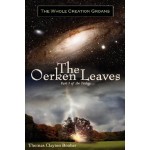
The Oerken Leaves
by Thomas Clayton Booher
Part 1 of The Whole Creation Groans trilogy
Published 2008 by Tome Publishing, 292 pages
Genre: Christian sci-fi/fantasy, middle grade and up, ideal for read-aloud
John Eaton is a 13-year-old boy who lives in North Carolina near an abandoned farm, Griffin Farm. John is curious and feels moved to investigate after his father mentions mysterious disappearances of yesteryear at Griffin Farm.
A hundred years earlier, a family of four vanished from Griffin Farm. There were some very mysterious circumstances–we learn that they involved crystal-encased oak leaves and a huge oak tree that’s here one day and gone the next.
Also investigating is Brutus Malroye, the school bully, whose relatives actually lived on Griffin Farm for a time after the disappearances. It turns out that Brutus is aware of and wants to go to the paradise-like place reachable somehow from Griffin Farm. Experimenting with crystal-encased oak leaves, he manages to get himself there.
It’s a planet called Eskathoer, out there in the universe where individuals can planet-hop using gateways that are actually oak (“oerken”) trees. But access to the dark planet, Earth, is forbidden.
Eskathoer isn’t a fallen world. Its inhabitants are trusting and sweet, and they aren’t ready for Brutus. So they call for John and his two siblings to help them persuade Brutus to leave. John and his siblings agree to help.
As the story goes on, the task looks more and more difficult. How will John, Josie, and Matt get Brutus to stop spoiling Eskathoer and come home? And how will the Lord of creation save Eskathoer? In fact, since this book is part of a trilogy, the problem isn’t resolved at the end of this book.
What do I think?
This book has a classic, slow-paced feel, especially at the beginning. So it’s not particularly fashionable. But I like classics, don’t you?
Multiple characters are well-drawn and are given distinctive voices. Booher excels in this area.
There are lots of fun details about Eskathoer, which has a lot of parallels to earth. Instead of traffic lights, there are manned traffic baskets. Popcorn is unknown. People live to be hundreds of years old (except for Brutus who seems to be aging fast). Brutus provokes people to argue with each other, and they clearly aren’t any good at it. The fantasy world is refreshingly original.
The story does have a few flaws. For example, the author doesn’t develop Brutus’ motivation for wanting to leave Earth while a child, leaving me wondering whether Brutus’ family was hard to get along with. Also, the prologue puzzled me a bit. These flaws are quite outweighed by strengths, however.
Booher writes a tale particularly engaging for children in a read-aloud setting. Unlike some others of the same genre, this book has a fairly upbeat mood. Violence is absent. Families comfortable with the level of magic found in the Narnia tales will enjoy this book, which clearly has a lot to teach about recognizing our sinful natures.
